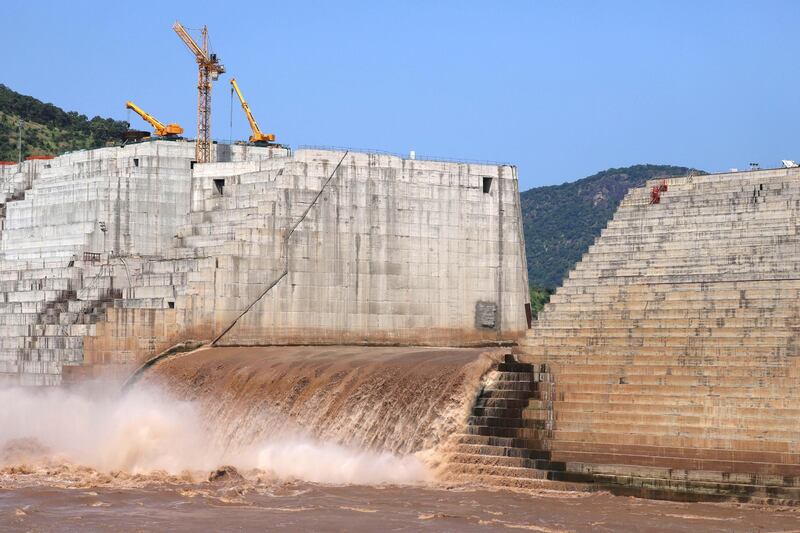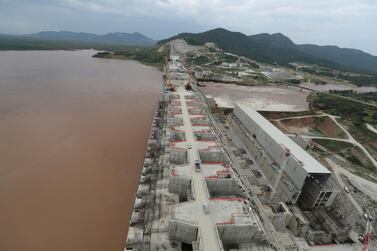The leaders of Egypt and Ethiopia agreed on Thursday to immediately resurrect an independent technical committee tasked with formulating a plan to operate an upstream Nile dam, in what amounts to a partial breakthrough that could defuse growing tensions between the two nations.
The dispute over the impact of Ethiopia's dam on Egypt’s vital share of the Nile water morphed this week into an ominous war of words after the East African nation’s Nobel Peace Prize-winning prime minister warned he could muster millions of people if conflict broke out with Egypt over the nearly completed structure on the Blue Nile.
Addis Ababa’s saber-rattling and Cairo’s measured response came as the United States announced it was inviting the foreign ministers of Egypt, Ethiopia and Sudan to Washington for talks on the dispute. Russian President Vladimir Putin on Thursday also offered to mediate between Egypt and Ethiopia, but it was not immediately clear if they accepted the offer.
Egyptian President Abdel Fattah El Sisi and Ethiopian Prime Minister Abiy Ahmed discussed the dam in a meeting on the sidelines of a Russia-Africa summit in the Black Sea city of Sochi. Egyptian presidential spokesman Bassam Radi said the two leaders wanted the technical committee to work “more openly and positively” toward reaching a “final and comprehensive” scenario for operating the dam and filling its massive reservoir.
He said the two leaders also agreed to move past what he described as the “negative fallout” from comments made by Mr Abiy.
“Some say things about use of force [by Egypt]. It should be underlined that no force could stop Ethiopia from building a dam,” the Ethiopian leader told parliament on Tuesday. “If there is a need to go to war, we could get millions readied. If some could fire a missile, others could use bombs. But that’s not in the best interest of all of us.”
Egypt has refrained from any mention of military action to resolve the dispute, but some pro-government commentators have floated the notion that if Egypt does go into war against Ethiopia, it would be in self defence.
The closest Egypt came to making a threat was a comment by Mr El Sisi while in New York last month. He said his country would not accept the imposition of a de-facto situation regarding the operation of the dam.
Mr Abiy’s comments drew a sharp but measured response from Egypt, whose leader currently holds the rotating presidency of the African Union.
The foreign ministry said Egypt was “shocked” by the “negative references” and “unacceptable suggestions”, saying it was “inappropriate to get into scenarios that include military options”.
Ethiopia, Egypt and Sudan have been involved in years of fruitless negotiations over operating the dam in a manner satisfactory to all three nations.
The Blue Nile, which originates in the Ethiopian highlands, accounts for about 85 per cent of the Nile waters, but only about 65 per cent of the water reaching Egypt. The Blue Nile and the White Nile, which originates in central Africa, meet near Khartoum, Sudan’s capital, to become the Nile that flows through the deserts of northern Sudan and into Egypt all the way to the Mediterranean coast.
Egypt depends on the Nile for more than 90 per cent of its water needs. It says it wants the reservoir behind the hydropower dam filled over seven years to minimise the impact on its vital share of the river’s water. It also wants Ethiopia to release 40 billion cubic metres every year and show flexibility during future spells of drought.
With a population matching Egypt’s 100 million, Ethiopia views the dam as essential to its development. The structure has also become a symbol of national pride at a time when many Nile basin nations feel Egypt has unjustifiably enjoyed the lion’s share of the river’s water – an annual 55 billion cubic metres – for far too long.
Cairo declared negotiations with Addis Ababa over the dam deadlocked and demanded that a foreign mediator be brought in. Ethiopia disagrees with that assessment and refuses to invite a third party, arguing that outstanding problems could still be resolved in talks.
Ethiopia’s official media made no mention of the dam dispute in reports on Mr Abiy’s meeting with Mr El Sisi on Thursday, saying only that they discussed issues of mutual interest.







